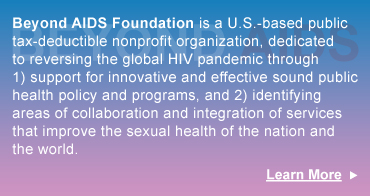CDC Plan Applauded - HIV Testing Barriers Would Be Eliminated
Nikki Cobb, Staff Writer
San Bernardino County Sun, October 1, 2006
Physicians and AIDS activists alike are lauding a proposal from the national Centers for Disease Control and Prevention that would make HIV testing a more routine part of health care.
The proposal would eliminate written consent and pre-test counseling as requirements for HIV testing.
Both have been seen by critics as barriers to adequate testing.
"I believe anything that will get everybody tested is a good thing," said Joe Acosta, vice chairman of the CARE coalition and a member of the California HIV/AIDS Planning Group.
The new protocol, if adopted, will allow hospitals to do an HIV test as part of the standard panel of blood tests for such factors as blood sugar and kidney and liver function.
It also would allow HIV screening to become standard for all pregnant women.
The CDC's recommendations would apply to patients being tested in a medical setting, such as a hospital emergency room, urgent-care clinics and substance-abuse treatment clinics.
They would not apply to individuals in non-clinical settings such as community-based organizations.
And anybody not wanting the test still could opt out.
Acosta said the new regulations would help fight AIDS.
Dr. Ronald Hattis, a member of the Beyond Aids Foundation and chief physician in charge of HIV testing at Patton State Hospital, said the CDC's recommendations are a breakthrough in the fight against HIV.
The signature and counseling requirements for HIV testing often scared inmates off, Hattis said.
"It was prohibitive to about three-quarters of the inmates," Hattis said. "As a result, we only got a small minority to sign the consent."
Women were especially difficult to convince, Hattis said.
"Women are not going to consider it a routine test," he said. "They think the doctor is picking them out for being promiscuous."
California this year made HIV a reportable disease, requiring doctors to alert the public health department when they find a case. Hattis said this too is a step in the right direction, allowing officials to track the epidemic and determine where to focus their efforts.
For Acosta, it's all good news.
"The sooner people are tested, the sooner they are diagnosed (and) they will have many more options they can avail themselves of," he said. "The sooner they are tested, the better off they will be.
FOR IMMEDIATE RELEASE
Contact: Ronald P. Hattis, MD, MPH, (909) 838-4157
info@beyondaids.org www.beyondaids.org
Fax and Messages: 888-BEY-AIDS
1540 Barton Road #435, Redlands, CA 92373
National Office: 611 Pennsylvania Ave. #1600
Washington, DC 22203-1600
Note: This press release concerns the release on 9/22/06 by the Centers for Disease Control and Prevention (CDC) of new recommendations on routine HIV testing in the health care setting. These were published in the Morbidity and Mortality Weekly Report (MMWR), 55(RR14);1-17, and previewed at http://www.cdc.gov/mmwr/preview/mmwrhtml/rr5514a1.htm
BEYOND AIDS FOUNDATION BACKS NEW HIV TESTING RECOMMENDATIONS
The Beyond AIDS Foundation today strongly endorsed new recommendations from the Centers for Disease Control and Prevention (CDC) for routine HIV testing in health care settings.
"This good news is long long overdue," said Beyond AIDS founder Cary Savitch, MD, an infectious disease physician who has treated HIV/AIDS patients since the beginning of the epidemic. "Now is the time to move ahead," he continued. "AIDS has been a public health emergency since the very first case. Why did public health officials wait until over 10 million people died (and over 35 million HIV infections who will eventually die) before initiating the simple tool of universal HIV screening needed to identify all index cases and halt the spread of HIV?" Savitch noted that the "opt-out" requirement could still be a barrier to truly routine testing.
"We urge CDC to accelerate these efforts, because lives are lost with every day of continued politically generated "exceptionalism" in our approach to HIV/AIDS." said Foundation President Ronald Hattis, MD, a public health physician. "We hope that the release of the new recommendations will be the start of a new CDC activism in support of treating HIV/AIDS like other diseases, so that we can more easily identify and treat infected individuals," Hattis added.
The Beyond AIDS Foundation has long been in support of making HIV testing more routine and enthusiastically endorses this approach, which its leaders believe is long overdue. The new recommendations will bring CDC into synchrony with Prevention Recommendations 2, 3, and 4 of the Presidential Advisory Council on HIV/AIDS (PACHA) report of 12/05, "Achieving and HIV-Free Generation" (http://aids.gov/federal-resources/pacha/about-pacha).
The Foundation hopes to see CDC testimony before Congress on the need for incentives in the Ryan White CARE Act renewal, and urging states to revise laws that currently require written consent and/or pretest counseling for HIV testing. Beyond AIDS also urged that CDC immediately act to assure that its grants will no longer require prevention counseling prior to HIV testing. "Over recent years, we have learned that such requirements have served as an unintentional barrier to routine testing, and to the identification of an estimated quarter million infected Americans who are not aware of their HIV status," said Hattis.
The Beyond AIDS Foundation is a national 501(c)3 organization devoted to improving the public health response to the HIV/AIDS epidemic through education and research. Its parent organization, Beyond AIDS, Inc., also works for legislation to achieve better control and treatment for HIV/AIDS.
![]() Return to Archived Articles and Letters
Return to Archived Articles and Letters

